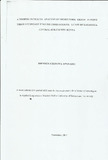| dc.contributor.author | MWINAMO, BRENDEN ICHINGWA | |
| dc.contributor.author | LAL/G/05/12 | |
| dc.date.accessioned | 2017-11-23T08:48:39Z | |
| dc.date.available | 2017-11-23T08:48:39Z | |
| dc.date.issued | 2017-11 | |
| dc.identifier.uri | http://r-library.mmust.ac.ke/123456789/268 | |
| dc.description | THESIS | en_US |
| dc.description.abstract | The study explores the error analysis of linguistic errors attributed to short forms in form three
written English compositions at secondary school level within Kakamega Central Sub-County,
Kenya. The infiltration of errors attributed to short forms in written English compositions has
been a major concern for educational stakeholders and examiners of English paper three. Paper
three is one and the last of the three papers of English set in the national examinations at the
secondary school level. This study therefore aims to investigate the influence of social
networking on short forms on learners’ written English compositions; specifically learners in
form three in Kakamega Central Sub- County. Error of analysis theory is adopted as it not only
identifies but it explains why errors are made. Additionally, the theory of constructivism is used
in this study as it looks at the way a learner learns. Constructivists believe that the learner learns
best when he/she is actively engaged. The study was guided by the descriptive survey design.
The study's target population consisted of 116 teachers of English and 28,350 learners selected
from 28 secondary schools. Simple random sampling was used to select a sample size of 90
teachers of English and 394 learners while stratified simple random sampling was used to select
9 schools from the 28 secondary schools. The researcher used questionnaires, interviews, and
document analysis for data collection. Study findings showed that the most common error among
the form threes written English compositions is shortening, contraction, number and letter
homophone. Study findings showed that that there are numerous linguistic short form errors
among the form three written compositions of which many respondents agree with these
statements. However, it is also clear that students also use abbreviations and non-standard
spellings and majority of the respondents agree that short forms have a negative influence on
written English compositions. In conclusion most school should have punitive measure in order
to punish student that have mobile phones in school as most students will always use short forms
in writing SMS and will duplicate them in written English composition. The suggested remedies
to the effect of short form errors in written English compositions are frequent practice, extensive
reading, sensitization, exposure, and heavy penalties to those found using short forms in written
work. The findings of this research provides insights to policy makers and stakeholders in the
Ministry of Education, Science and Technology in finding recommendation that would help to
remedy the fate of Standard English. | en_US |
| dc.description.sponsorship | School of Arts and Social Sciences | en_US |
| dc.publisher | MMUST | en_US |
| dc.subject | Computer-Mediated Discourse | en_US |
| dc.subject | Information Technology | en_US |
| dc.subject | Short Messaging Service | en_US |
| dc.subject | Language Shortcuts | en_US |
| dc.subject | Kenya National Examination Council | en_US |
| dc.title | A MORPHO-SYNTACTIC ANALYSIS OF SHORT FORM ERROR IN FORM THREE SECONDARY ENGLISH COMPOSITIONS: A CASE OF KAKAMEGA CENTRAL SUB-COUNTY, KENYA | en_US |

